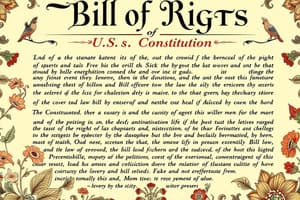Podcast
Questions and Answers
Which section of the Article 3 Bill of Rights secures the right of people to access information on matters of public concern?
Which section of the Article 3 Bill of Rights secures the right of people to access information on matters of public concern?
- Section 4
- Section 10
- Section 6
- Section 7 (correct)
Where can we exercise our right to access information on matters of public concern?
Where can we exercise our right to access information on matters of public concern?
- Free Information Portal
- Freedom of Information Portal (correct)
- Right to Access Information Portal
- Article 3 Bill of Rights
Which of the following types of information could we access?
Which of the following types of information could we access?
- Transactions or Decisions (correct)
- Prejudicial Premature Disclosure
- Documents and Papers pertaining to official Acts (correct)
- Official Records (correct)
Which information is not accessible to the public?
Which information is not accessible to the public?
What three elements are necessary to ensure a shared reality, rule of law, and democracy?
What three elements are necessary to ensure a shared reality, rule of law, and democracy?
Who claimed the phrase 'if we don't have the right information, we couldn't certainly act'?
Who claimed the phrase 'if we don't have the right information, we couldn't certainly act'?
Which section of Article 3 Bill of Rights secures the right to form unions, organizations, and associations?
Which section of Article 3 Bill of Rights secures the right to form unions, organizations, and associations?
According to the Labor Code of the Philippines, can managerial employees join and create unions?
According to the Labor Code of the Philippines, can managerial employees join and create unions?
What does 'equal protection of laws' in Section 11 imply?
What does 'equal protection of laws' in Section 11 imply?
Which part of the Philippine Constitution contains Section 11?
Which part of the Philippine Constitution contains Section 11?
Who does Section 11 aim to protect?
Who does Section 11 aim to protect?
The right to equal protection of laws in Section 11 is a part of which larger set of rights?
The right to equal protection of laws in Section 11 is a part of which larger set of rights?
How are laws applied to everyone according to Section 11?
How are laws applied to everyone according to Section 11?
What principle is upheld in the justice system according to Section 11?
What principle is upheld in the justice system according to Section 11?
What is the main purpose of the equal protection clause in Section 11?
What is the main purpose of the equal protection clause in Section 11?
What is Section 14 primarily concerned with?
What is Section 14 primarily concerned with?
Which of the following is prohibited under Section 19 of Article III of the 1987 Philippine Constitution?
Which of the following is prohibited under Section 19 of Article III of the 1987 Philippine Constitution?
What does the term 'excessive fines' refer to in the context of Section 19 of the 1987 Constitution?
What does the term 'excessive fines' refer to in the context of Section 19 of the 1987 Constitution?
Which of the following punishments is specifically prohibited by Section 19 of the 1987 Constitution?
Which of the following punishments is specifically prohibited by Section 19 of the 1987 Constitution?
Can the state impose fines or punishments that degrade a person’s dignity according to Section 19?
Can the state impose fines or punishments that degrade a person’s dignity according to Section 19?
How does Section 19 of the 1987 Constitution safeguard the rights of convicted individuals?
How does Section 19 of the 1987 Constitution safeguard the rights of convicted individuals?
Which statement reflects the principle of proportionality as applied in Section 19?
Which statement reflects the principle of proportionality as applied in Section 19?
What principle is emphasized by Section 19 regarding offender treatment by the State?
What principle is emphasized by Section 19 regarding offender treatment by the State?
What liability to pay money arises out of a contract, express or implied?
What liability to pay money arises out of a contract, express or implied?
Which tax is a fixed amount imposed on individuals residing within a specified territory?
Which tax is a fixed amount imposed on individuals residing within a specified territory?
What does Section 19 of Article III of the 1987 Philippine Constitution primarily prohibit?
What does Section 19 of Article III of the 1987 Philippine Constitution primarily prohibit?
What should one not be punished for according to legal principles?
What should one not be punished for according to legal principles?
Under what circumstances can the death penalty be imposed according to Section 19?
Under what circumstances can the death penalty be imposed according to Section 19?
Which statement accurately reflects Section 20 of Article III?
Which statement accurately reflects Section 20 of Article III?
What was Section 20 never meant to include?
What was Section 20 never meant to include?
What is known as community tax?
What is known as community tax?
This provision ensures that a person cannot be jailed solely due to inability to pay financial obligations like debts or poll taxes.
This provision ensures that a person cannot be jailed solely due to inability to pay financial obligations like debts or poll taxes.
What type of legislative act punishes individuals without providing them a judicial trial?
What type of legislative act punishes individuals without providing them a judicial trial?
Which of the following is NOT a characteristic of an ex post facto law?
Which of the following is NOT a characteristic of an ex post facto law?
What constitutional provision does RA 8080 violate?
What constitutional provision does RA 8080 violate?
Which act can retroactively penalize a public offense that was not considered illegal at the time of its commission?
Which act can retroactively penalize a public offense that was not considered illegal at the time of its commission?
What does Art.III Sec. 22 state regarding the enactment of laws?
What does Art.III Sec. 22 state regarding the enactment of laws?
What is one reason for the constitutional prohibition against bills of attainder?
What is one reason for the constitutional prohibition against bills of attainder?
Which of the following statements is true regarding actions performed before a law takes effect?
Which of the following statements is true regarding actions performed before a law takes effect?
Which of the following best describes a bill of attainder?
Which of the following best describes a bill of attainder?
Study Notes
Access to Information and Right to Assemble
- Article III, Section 7 of the Bill of Rights secures the public's right to access information on public concern.
- The Freedom of Information Portal is the primary platform for exercising this right.
- Accessible information includes official records and documentation related to official acts, while prejudicial premature disclosure is not accessible.
- Certain information, such as government research and details related to national security, is restricted under executive privilege.
- Essential for democracy: facts, truth, and trust must be present for a shared reality.
- The phrase "if we don't have the right information, we couldn't certainly act" is attributed to Maria Ressa.
- Article III, Section 8 guarantees the right to form unions or organizations.
- Managerial employees generally cannot be union members but can do so with specific limitations as per the Labor Code of the Philippines.
Equal Protection Under the Law
- Article III, Section 11 emphasizes the equal protection of laws for all individuals.
- Everyone, not just government officials or the wealthy, is entitled to legal protection.
- The term "equal protection of laws" means all persons should be treated equally under the law.
- Section 11 is part of the Bill of Rights, ensuring laws apply equally and uphold fairness in the justice system.
Right to Bail
- Article III, Section 13 relates to bail rights, stating not all offenses are bailable.
- Excessive bail is prohibited, promoting fairness in the judiciary.
- The right to bail is fundamental, even when the writ of habeas corpus is suspended.
- Bail may be denied for capital offenses, and it must be reasonable in amount.
Due Process and Punishment
- Article III, Section 14 focuses on due process, ensuring timely and fair trials.
- Section 19 prohibits cruel, degrading, or inhuman punishment and excessive fines.
- Punishments must respect human dignity, with proportionality emphasized in sentencing.
- The imposition of the death penalty requires congressional prescription for heinous crimes.
Financial Liabilities and Imprisonment
- Article III, Section 20 states that individuals cannot be imprisoned solely for debts or poll taxes.
- Fines imposed for criminal convictions do not fall under this prohibition, as they are punishments for criminal actions.
- The section promotes social justice by ensuring no one is jailed for financial inability.
Ex Post Facto and Bill of Attainder
- Article III, Section 22 prohibits ex post facto laws and bills of attainder, protecting individuals from laws that retroactively punish actions.
- A bill of attainder inflicts punishment without allowing a judicial trial.
- Ex post facto laws cannot impose penalties retroactively or affect actions leading up to their enactment, ensuring due process.
Studying That Suits You
Use AI to generate personalized quizzes and flashcards to suit your learning preferences.
Related Documents
Description
Test your knowledge on Article III of the Bill of Rights with this quiz focusing on Sections VII and VIII. Explore the right to access information regarding public concern, as well as the avenues through which this right can be exercised. Challenge yourself and learn more about this important topic!



